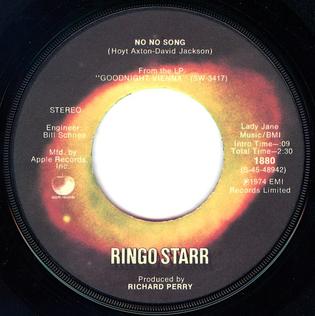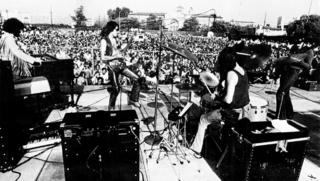Related Research Articles

Nicolette Larson was an American singer. She is perhaps best known for her work in the late 1970s with Neil Young and her 1978 hit single of Young's "Lotta Love", which hit No. 1 on the Hot Adult Contemporary Tracks chart and No. 8 on the pop singles chart. It was followed by four more adult contemporary hits, two of which were also minor pop hits.

Hoyt Wayne Axton was an American singer-songwriter, guitarist, and actor. He became prominent in the early 1960s, establishing himself on the West Coast as a folk singer with an earthy style and powerful voice. Among his best-known songs are "Joy to the World", "The Pusher", "No No Song", "Greenback Dollar", "Della and the Dealer", and "Never Been to Spain".

"Joy to the World" is a song written by Hoyt Axton and made famous by the band Three Dog Night. The song is also popularly known by its opening lyric, "Jeremiah was a bullfrog". Three Dog Night originally released the song on their fourth studio album, Naturally, in November 1970, and subsequently released an edited version of the song as a single in February 1971.

"No No Song" is a 1974 song by English musician Ringo Starr. Written by Hoyt Axton and David Jackson, it appeared on Starr's 1974 album, Goodnight Vienna. It was released as a single in the US on 27 January 1975, backed with "Snookeroo," and reached No. 1 in Canada, #3 in the Billboard charts, becoming his 7th and last top 10 hit. It also reached No. 1 on Cash Box charts in the US.

Lisa Brokop is a Canadian country music singer/songwriter and actress. Active since 1990 in the country music field, she has released a total of seven studio albums and has charted more than twenty singles on the country music charts in her native Canada. Several of these singles have also crossed over to the American country music charts, although she has not entered the Top 40 in the U.S.; her highest charting songs, "Give Me a Ring Sometime" and "Take That", both peaked at No. 52 in 1994. Her highest chart single is the No. 8 "Better Off Broken" from 1999 in Canada.

Gold: Their Great Hits is a greatest hits album released by the Canadian-American hard rock band Steppenwolf. The album, released in 1971, charted at #24 on the Billboard Pop Albums charts and was certified "gold" by the RIAA on April 12, 1971. Initial pressings of the album came in a gatefold sleeve, with a detachable poster of the band.

The discography of Steppenwolf, an American Hard rock band, consists of 13 studio albums, nine compilation albums, 21 singles, and three music videos. The band was formed in 1967 after some members of The Sparrows split. Group members included John Kay, Michael Monarch, Goldy McJohn, Rushton Moreve and Jerry Edmonton. Their first album, Steppenwolf, was released in 1968, which sold well and reached 6 on Billboard. That same year, Steppenwolf covered "The Pusher". The song was later used in Easy Rider. The album's most successful single was "Born to Be Wild", which reached No. 2 on the Billboard. At the time of the release of second album, The Second, the band's bassist Rushton Moreve had a dispute with band leader John Kay, and was eventually replaced with Nick St. Nicholas. The album's single was "Magic Carpet Ride" which reached number 3 on Billboard.

Anne Murray / Glen Campbell is an album by American singer Glen Campbell and Canadian singer Anne Murray, released in 1971. The album contained both new material, and duet versions of songs each artist had recorded individually, as well as an early version of "You're Easy to Love", which later became a hit for Hank Snow, the standard "Canadian Sunset", and Brotherhood of Man's 1970 hit "United We Stand".

"Never Been to Spain" is a song written by Hoyt Axton, originally released on his 1971 LP Joy to the World and later that year performed by Three Dog Night, with Cory Wells on lead vocal. It was featured on their 1971 album Harmony. The recording was produced by Richard Podolor.

Miss Donna Fargo is the fourth studio album released by American country artist Donna Fargo. The album was released in 1974 on Dot Records and was produced by Fargo's husband and manager Stan Silver. Unlike any of Fargo's previous releases, Miss Donna Fargo spawned three singles, all of which became Top 10 singles on the Billboard country chart, including "You Can't Be a Beacon If Your Light Don't Shine".

"Can't You See" is a song written by Toy Caldwell of The Marshall Tucker Band. The song was originally recorded by the band on their 1973 debut album, The Marshall Tucker Band, and released as the album's first single. It was re-released in 1977 and peaked at number 75 on the Billboard Hot 100. Cover versions of "Can't You See" have charted for Waylon Jennings and the Zac Brown Band with Kid Rock (2010).

"Mississippi Cotton Picking Delta Town" is a song written by Harold Dorman and George Gann, and recorded by American country music artist Charley Pride. It was released in August 1974 as the first single from his album Pride of America. The song peaked at number 3 on the Billboard Hot Country Singles chart. It also reached number 1 on the RPM Country Tracks chart in Canada.
"We Could" is a song written by Felice Bryant and originally recorded by "Little" Jimmy Dickens in 1955. It's been recorded by numerous acts over the years, including American pop crooner Al Martino, whose version peaked at number 41 on Billboard Hot 100 chart in December 1964, but is best remembered by a version recorded by American country music artist Charley Pride. It was released as the first single from his album Country Feelin'. This version, released nearly ten years after Martino's, peaked at number 3 on the Billboard Hot Country Singles chart. It also reached number 1 on the RPM Country Tracks chart in Canada.
"Woman to Woman" is a song written by Billy Sherrill, and recorded by American country music artist Tammy Wynette. It was released in July 1974 as the only single from her album of the same name. The song peaked at number 4 on the Billboard Hot Country Singles chart. It also reached number 1 on the RPM Country Tracks chart in Canada.
"Bonaparte's Retreat" is the name of two related songs. The original was a wordless melody that existed as various fiddle tunes dating back to at least the late 1800s and probably well before that. In 1950, American country music artist Pee Wee King recorded a modified version of the song, with lyrics added, which he also called "Bonaparte's Retreat". This latter song has been covered by many country artists.
"They Don't Make 'em Like My Daddy" is a single by American country music artist Loretta Lynn. Released in April 1974, it was the first single from her album They Don't Make 'em Like My Daddy. The song peaked at number 4 on the Billboard Hot Country Singles chart. It also reached number 1 on the RPM Country Tracks chart in Canada.
"Hey Loretta" is a single by American country music artist Loretta Lynn. Released in October 1973, it was the second single from her album Love Is the Foundation. The song peaked at number 3 on the Billboard Hot Country Singles chart. It also reached number 1 on the RPM Country Tracks chart in Canada.
"I'm Not Through Loving You Yet" is a song co-written and recorded by American country music artist Conway Twitty. It was released in April 1974 as the first single and title track from his album I'm Not Through Loving Yet. The song peaked at number 3 on the Billboard Hot Country Singles chart. It also reached number 1 on the RPM Country Tracks chart in Canada. The song was written by Twitty and L. E. White.
"Sweet Magnolia Blossom" is a song recorded by American country music artist Billy "Crash" Craddock. It was released in December 1973 as the third single from his album Mr. Country Rock. The song peaked at number 3 on the Billboard Hot Country Singles chart. It also reached number 1 on the RPM Country Tracks chart in Canada. The song was written by Rory Bourke.

"Geronimo's Cadillac" is a song co-written and recorded by American country folk artist Michael Martin Murphey, then billed as Michael Murphey, and was the title cut of his 1972 debut album Geronimo's Cadillac which was an A&M Records release.
References
- ↑ "Hoyt Axton singles". Allmusic . Retrieved 18 March 2011.
- ↑ "RPM Country Singles for June 29, 1974". RPM . Retrieved 18 March 2011.